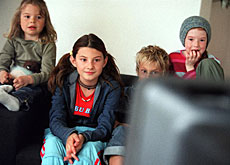
Doctors sound alarm over television

Swiss paediatricians are warning of the dangers of children spending excessive periods of time in front of a television or computer screen.
In the latest edition of the health booklet distributed to parents, they advise that children should not sit in front of a screen for more than seven to ten hours a week.
“When some toddlers tell me about the film they just watched before coming to school, the mind boggles,” said one teacher in Zurich, who is in no doubt that the number of children who watch a lot of television – often alone – is increasing.
The Swiss Paediatrics Society is also ringing the alarm bell: from now on a warning can be found in the health booklet, which children keep from birth until they are 14.
The warning is not meant to be moralistic, but aims above all to raise awareness.
In the chapter on “growing and developing”, the doctors warn: “Did you know that spending too much time in front of a television or computer (more than seven to ten hours a week) harms the physical and psychological development of children and adolescents?”
“Television does not meet the cognitive, emotional and psychomotor needs of young children,” said Nicole Pellaud from the Swiss Paediatrics Society, who is responsible for the new edition of the health booklet.
“It could even have a negative effect by depriving them of other stimuli appropriate for their age and by getting them used to a “televised” solution to their needs in the future.”
Moderation
Paul Bouvier, director of health for young people in the canton of Geneva, confirms that television is not a tool designed for the very young. “They like it – there’s movement and colour – but there’s no real meaning to it,” he said.
“What’s more, this constant mental stimulation is tiring. Television can provide something – it can help develop skills – from the age of three, however viewing should be limited to a few short periods a day and always supervised by an adult.”
The amount of television watched by children in Switzerland is far lower than levels measured elsewhere, especially as the small screen loses ground compared with video games and computers.
“An estimated ten per cent of [Swiss] adolescents watch four hours of television a day,” said Bouvier. “In the United States, it’s a third.”
Disaster
If the two fundamental factors – time spent in front of the screen and the content – are combined, they can cause aggressive behaviour in the very short term.
“All studies show that,” said Bouvier. “A book never has this effect.”
The alert has also been raised for another reason, which the health booklet mentions in a chapter on food.
“The effects of too much television on obesity remain under-estimated,” said an angry Bouvier.
“What’s more, television extols the benefits of mass-produced food – it’s a real disaster in terms of public health.”
swissinfo, Ariane Gigon Bormann in Zurich
The health booklet is a brochure given to parents on the birth of their child. They then present the booklet whenever the child is given a check-up.
The booklet contains sections for midwives and paediatricians, and also spaces for parents to note their child’s progress.
It also contains a wealth of practical and general information on a child’s development.
The booklet has just been edited for the first time since 1996, under the guidance of the Swiss Paediatrics Society.
The insurer CSS, which finances and distributes the booklet, says the booklet reaches 90 per cent of Swiss parents. 89,000 copies were printed in 2006 – up from 67,000 in 2005.
Several recent violent incidents involving children have reopened the debate in Switzerland and elsewhere on the influence of television, the cinema and video games on children.
Paediatricians estimate that in Switzerland one in ten adolescents watches four hours of television a day. In the United States the figure is one in three.
Paediatricians say children under three years old should not watch television.
For only children, their viewing should be limited to one or two hours a day – under adult supervision.

In compliance with the JTI standards
More: SWI swissinfo.ch certified by the Journalism Trust Initiative

























You can find an overview of ongoing debates with our journalists here . Please join us!
If you want to start a conversation about a topic raised in this article or want to report factual errors, email us at english@swissinfo.ch.